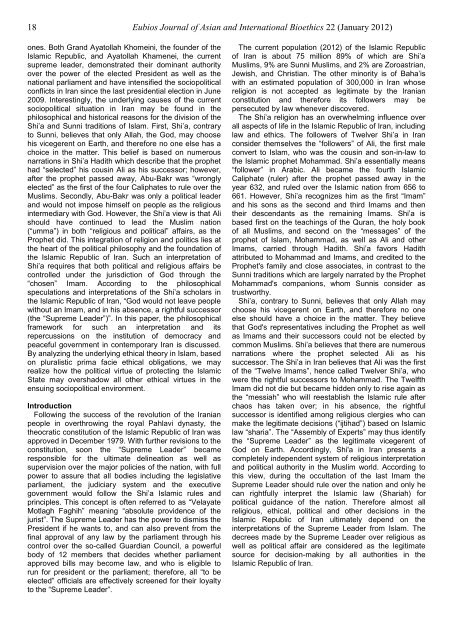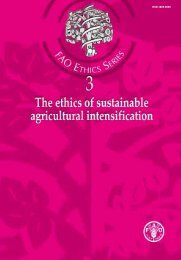Eubios Journal of Asian and International Bioethics - Eubios Ethics ...
Eubios Journal of Asian and International Bioethics - Eubios Ethics ...
Eubios Journal of Asian and International Bioethics - Eubios Ethics ...
Create successful ePaper yourself
Turn your PDF publications into a flip-book with our unique Google optimized e-Paper software.
18 <strong>Eubios</strong> <strong>Journal</strong> <strong>of</strong> <strong>Asian</strong> <strong>and</strong> <strong>International</strong> <strong>Bioethics</strong> 22 (January 2012)<br />
ones. Both Gr<strong>and</strong> Ayatollah Khomeini, the founder <strong>of</strong> the<br />
Islamic Republic, <strong>and</strong> Ayatollah Khamenei, the current<br />
supreme leader, demonstrated their dominant authority<br />
over the power <strong>of</strong> the elected President as well as the<br />
national parliament <strong>and</strong> have intensified the sociopolitical<br />
conflicts in Iran since the last presidential election in June<br />
2009. Interestingly, the underlying causes <strong>of</strong> the current<br />
sociopolitical situation in Iran may be found in the<br />
philosophical <strong>and</strong> historical reasons for the division <strong>of</strong> the<br />
Shi’a <strong>and</strong> Sunni traditions <strong>of</strong> Islam. First, Shi’a, contrary<br />
to Sunni, believes that only Allah, the God, may choose<br />
his vicegerent on Earth, <strong>and</strong> therefore no one else has a<br />
choice in the matter. This belief is based on numerous<br />
narrations in Shi’a Hadith which describe that the prophet<br />
had “selected” his cousin Ali as his successor; however,<br />
after the prophet passed away, Abu-Bakr was “wrongly<br />
elected” as the first <strong>of</strong> the four Caliphates to rule over the<br />
Muslims. Secondly, Abu-Bakr was only a political leader<br />
<strong>and</strong> would not impose himself on people as the religious<br />
intermediary with God. However, the Shi’a view is that Ali<br />
should have continued to lead the Muslim nation<br />
(“umma”) in both “religious <strong>and</strong> political” affairs, as the<br />
Prophet did. This integration <strong>of</strong> religion <strong>and</strong> politics lies at<br />
the heart <strong>of</strong> the political philosophy <strong>and</strong> the foundation <strong>of</strong><br />
the Islamic Republic <strong>of</strong> Iran. Such an interpretation <strong>of</strong><br />
Shi’a requires that both political <strong>and</strong> religious affairs be<br />
controlled under the jurisdiction <strong>of</strong> God through the<br />
“chosen” Imam. According to the philosophical<br />
speculations <strong>and</strong> interpretations <strong>of</strong> the Shi’a scholars in<br />
the Islamic Republic <strong>of</strong> Iran, “God would not leave people<br />
without an Imam, <strong>and</strong> in his absence, a rightful successor<br />
(the “Supreme Leader”)”. In this paper, the philosophical<br />
framework for such an interpretation <strong>and</strong> its<br />
repercussions on the institution <strong>of</strong> democracy <strong>and</strong><br />
peaceful government in contemporary Iran is discussed.<br />
By analyzing the underlying ethical theory in Islam, based<br />
on pluralistic prima facie ethical obligations, we may<br />
realize how the political virtue <strong>of</strong> protecting the Islamic<br />
State may overshadow all other ethical virtues in the<br />
ensuing sociopolitical environment.<br />
Introduction<br />
Following the success <strong>of</strong> the revolution <strong>of</strong> the Iranian<br />
people in overthrowing the royal Pahlavi dynasty, the<br />
theocratic constitution <strong>of</strong> the Islamic Republic <strong>of</strong> Iran was<br />
approved in December 1979. With further revisions to the<br />
constitution, soon the “Supreme Leader” became<br />
responsible for the ultimate delineation as well as<br />
supervision over the major policies <strong>of</strong> the nation, with full<br />
power to assure that all bodies including the legislative<br />
parliament, the judiciary system <strong>and</strong> the executive<br />
government would follow the Shi’a Islamic rules <strong>and</strong><br />
principles. This concept is <strong>of</strong>ten referred to as “Velayate<br />
Motlagh Faghih” meaning “absolute providence <strong>of</strong> the<br />
jurist”. The Supreme Leader has the power to dismiss the<br />
President if he wants to, <strong>and</strong> can also prevent from the<br />
final approval <strong>of</strong> any law by the parliament through his<br />
control over the so-called Guardian Council, a powerful<br />
body <strong>of</strong> 12 members that decides whether parliament<br />
approved bills may become law, <strong>and</strong> who is eligible to<br />
run for president or the parliament; therefore, all “to be<br />
elected” <strong>of</strong>ficials are effectively screened for their loyalty<br />
to the “Supreme Leader”.<br />
The current population (2012) <strong>of</strong> the Islamic Republic<br />
<strong>of</strong> Iran is about 75 million 89% <strong>of</strong> which are Shi’a<br />
Muslims, 9% are Sunni Muslims, <strong>and</strong> 2% are Zoroastrian,<br />
Jewish, <strong>and</strong> Christian. The other minority is <strong>of</strong> Baha’is<br />
with an estimated population <strong>of</strong> 300,000 in Iran whose<br />
religion is not accepted as legitimate by the Iranian<br />
constitution <strong>and</strong> therefore its followers may be<br />
persecuted by law whenever discovered.<br />
The Shi’a religion has an overwhelming influence over<br />
all aspects <strong>of</strong> life in the Islamic Republic <strong>of</strong> Iran, including<br />
law <strong>and</strong> ethics. The followers <strong>of</strong> Twelver Shi’a in Iran<br />
consider themselves the “followers” <strong>of</strong> Ali, the first male<br />
convert to Islam, who was the cousin <strong>and</strong> son-in-law to<br />
the Islamic prophet Mohammad. Shi’a essentially means<br />
“follower” in Arabic. Ali became the fourth Islamic<br />
Caliphate (ruler) after the prophet passed away in the<br />
year 632, <strong>and</strong> ruled over the Islamic nation from 656 to<br />
661. However, Shi’a recognizes him as the first “Imam”<br />
<strong>and</strong> his sons as the second <strong>and</strong> third Imams <strong>and</strong> then<br />
their descendants as the remaining Imams. Shi’a is<br />
based first on the teachings <strong>of</strong> the Quran, the holy book<br />
<strong>of</strong> all Muslims, <strong>and</strong> second on the “messages” <strong>of</strong> the<br />
prophet <strong>of</strong> Islam, Mohammad, as well as Ali <strong>and</strong> other<br />
Imams, carried through Hadith. Shi’a favors Hadith<br />
attributed to Mohammad <strong>and</strong> Imams, <strong>and</strong> credited to the<br />
Prophet's family <strong>and</strong> close associates, in contrast to the<br />
Sunni traditions which are largely narrated by the Prophet<br />
Mohammad's companions, whom Sunnis consider as<br />
trustworthy.<br />
Shi’a, contrary to Sunni, believes that only Allah may<br />
choose his vicegerent on Earth, <strong>and</strong> therefore no one<br />
else should have a choice in the matter. They believe<br />
that God's representatives including the Prophet as well<br />
as Imams <strong>and</strong> their successors could not be elected by<br />
common Muslims. Shi’a believes that there are numerous<br />
narrations where the prophet selected Ali as his<br />
successor. The Shi’a in Iran believes that Ali was the first<br />
<strong>of</strong> the “Twelve Imams”, hence called Twelver Shi’a, who<br />
were the rightful successors to Mohammad. The Twelfth<br />
Imam did not die but became hidden only to rise again as<br />
the “messiah” who will reestablish the Islamic rule after<br />
chaos has taken over; in his absence, the rightful<br />
successor is identified among religious clergies who can<br />
make the legitimate decisions (“ijtihad”) based on Islamic<br />
law “sharia”. The “Assembly <strong>of</strong> Experts” may thus identify<br />
the “Supreme Leader” as the legitimate vicegerent <strong>of</strong><br />
God on Earth. Accordingly, Shi'a in Iran presents a<br />
completely independent system <strong>of</strong> religious interpretation<br />
<strong>and</strong> political authority in the Muslim world. According to<br />
this view, during the occultation <strong>of</strong> the last Imam the<br />
Supreme Leader should rule over the nation <strong>and</strong> only he<br />
can rightfully interpret the Islamic law (Shariah) for<br />
political guidance <strong>of</strong> the nation. Therefore almost all<br />
religious, ethical, political <strong>and</strong> other decisions in the<br />
Islamic Republic <strong>of</strong> Iran ultimately depend on the<br />
interpretations <strong>of</strong> the Supreme Leader from Islam. The<br />
decrees made by the Supreme Leader over religious as<br />
well as political affair are considered as the legitimate<br />
source for decision-making by all authorities in the<br />
Islamic Republic <strong>of</strong> Iran.

















